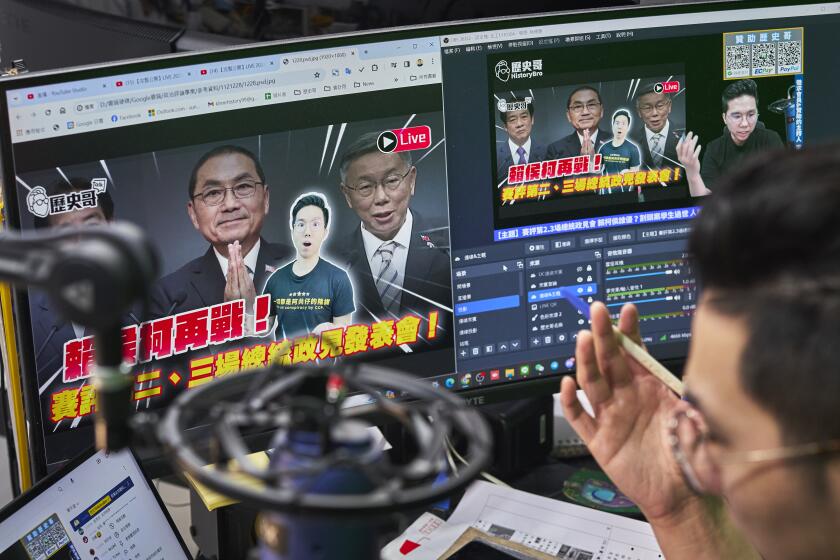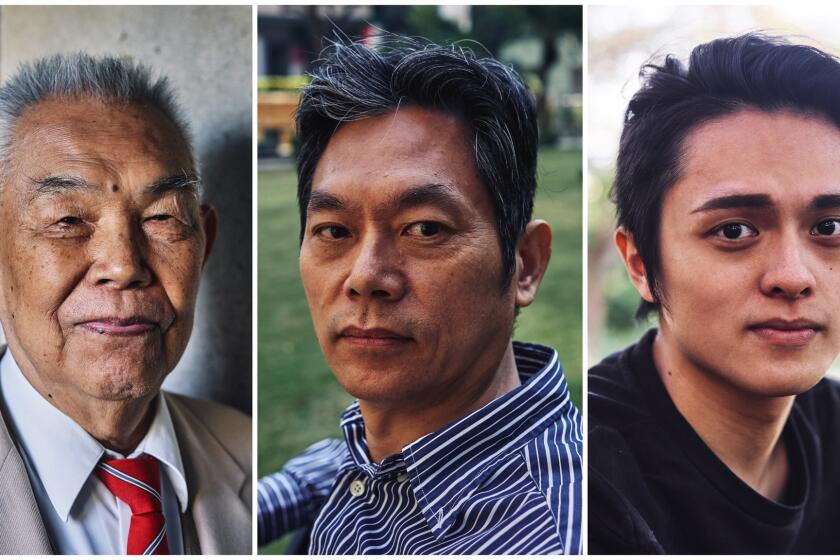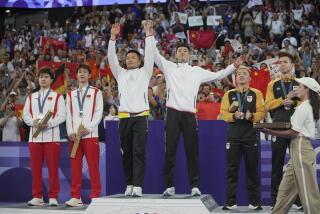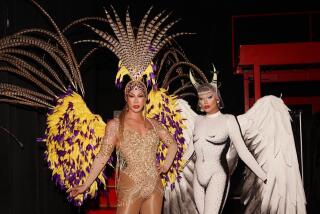On global stage, ‘RuPaul’s Drag Race’ Taiwanese winner says the word China hates

- Share via
TAIPEI, Taiwan — To hundreds of thousands of fans around the world who watched this season’s finale of the hit reality show “RuPaul’s Drag Race,” the final plea for victory from one of the contestants wasn’t especially memorable.
“It would mean a lot to be the first East Asian queen to win the crown and to be able to represent my country,” said the Taiwanese drag queen known as Nymphia Wind, who minutes later got her wish.
It was a single word in that sentence — “country” — that became a source of delight in Taiwan.
In deference to China, which claims Taiwan as part of its territory, all but a handful of countries refuse to recognize the island democracy as a sovereign nation. But to many who live there, it was a proud moment to hear one of their own refer to Taiwan as a country in its own right before a global audience.

Ko Ting-Hsun, who watched last month’s finale at home, started to cry as Nymphia Wind celebrated her win.
“A lot of people can relate that their own identity as Taiwanese may be diminished by stronger, bigger powers,” said Ko, 29. “This is one of the very few times that Taiwan can be represented on the international stage so unabashedly.”
Ko also performs as a drag queen, using the name Beauxba Tea.
Drag is a thriving art form in Taiwan that has helped advance its reputation as an open and tolerant society — one that is markedly distinct from mainland China, where the government has shut down LGBTQ+ support groups.
Three decades of public polling show the development of a distinct Taiwanese identity and shrinking support on the island for unification.
“The contrast with Taiwan has become ever greater,” said John Givens, associate professor in the international studies department at Spelman College in Atlanta. “They’re increasingly like, ‘Hey, we are this place where LGBTQ rights are respected.’ China has been cranking the knob the other way.”
The latest season of “RuPaul’s Drag Race” offered Taiwan a massive stage to show off its values and its culture.
Throughout the season, Nymphia Wind embraced her Taiwanese heritage with costumes that included an elaborate headpiece of a magpie — the national bird — and a balloon-filled homage to the iconic Taiwanese drink boba tea.
The performer’s real name is Leo Tsao. The 28-year-old fashion designer was born in Los Angeles and grew up in Hong Kong and Taiwan, joining the drag scene there in 2018 before moving to New York four years later.
Two former “RuPaul’s Drag Race” contestants crack the Apple and Spotify top 50 with podcasts that are all drag, all the time.
She never directly mentioned China during her time on the reality show. She didn’t have to.
Her victory was “a masterstroke of nation-building, soft power and cultural diplomacy,” Kazimier Lim, a public policy consultant with an interest in LGBTQ+ issues, wrote in a commentary for the Lowy Institute, a think tank in Sydney.
Lim suggested that her stardom could endear Taiwan to younger generations of Americans, at a time when the island of 23 million people is turning to the United States for more support as China has threatened to take it over by force if necessary.
“This empathy is not trivial,” he wrote. “It represents a powerful form of soft power that Taiwan will harness in the lead-up to war.”
The issue is so sensitive that Paramount, which distributes the show, initially said it would make Nymphia Wind available for an interview with The Times only if the reporter agreed not to ask her about geopolitics. After the Times refused to make such a deal, the company relented.
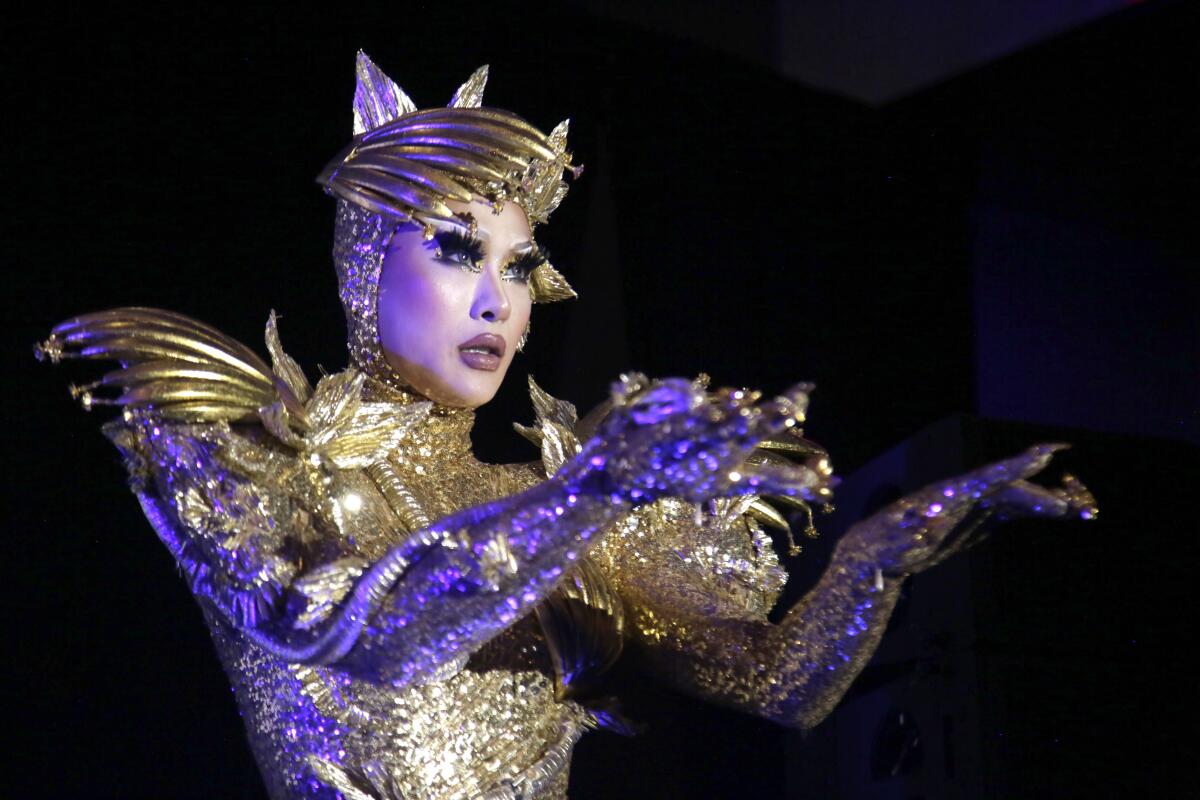
The performer suggested she was just stating the obvious when she spoke about Taiwan on the show and had little to add about the geopolitical implications of her comments.
“Taiwan to me is just a country,” she said. “If people think otherwise or don’t know that Taiwan is a country, then it really is on their educational level. There’s only so much you can do, but you can always try to improve awareness of the situation.”
Younger generations in particular increasingly consider themselves solely Taiwanese — even as they understand that they live in the shadow of mainland China.
Disinformation is exacerbating political polarization and mistrust amid a tight presidential race in Taiwan, where tension with China is running high.
“Taiwan is a small country and it doesn’t have a lot of power per se,” Nymphia Wind said. “Which is kind of sad, but this is the situation. You’ve gotta play with the cards you’re dealt, cleverly.”
She said she hopes to produce more drag performances in Taiwan that highlight the island’s unique characteristics, such as temple fairs, night markets and betel nut girls, who dress up to sell the chewy fruit stimulant at roadside stalls.
She is also expected to perform as part of a Taiwanese cultural program at this summer’s Paris Olympics.
“She’s the global phenomenon right now and she’s representing Taiwan,” said Benson Hu, 31, who has been doing drag in Taiwan for three years as Sandra Hoe. “That is the kind of international exposure that this country needs.”
After the season finale of “RuPaul’s Drag Race,” Taiwanese President Tsai Ing-wen took to social media to congratulate the winner: “Taiwan thanks you for living fearlessly.”
President-elect William Lai, who takes office May 20, also publicly congratulated her.
In China, there was little reaction to her victory. The reality show is not readily available for viewing there.
Chinese officials — often quick to condemn any description of Taiwan as a country — were silent, choosing not to draw attention to a show that few had seen. Discussion was also sparse on Chinese social media, where frank discussion of LGBTQ+ issues can get accounts flagged or blocked.
Some users on China’s Twitter-like platform Weibo criticized Nymphia Wind, without naming the drag queen, as a Taiwan separatist. But the newly crowned queen also attracted admirers, despite limited access to the series on the mainland.
“The first full-blooded Asian champion!” one user said. “I recommend everyone go watch the entire show.”
Special correspondent Xin-yun Wu in Taipei contributed to this report.
More to Read
Sign up for Essential California
The most important California stories and recommendations in your inbox every morning.
You may occasionally receive promotional content from the Los Angeles Times.


